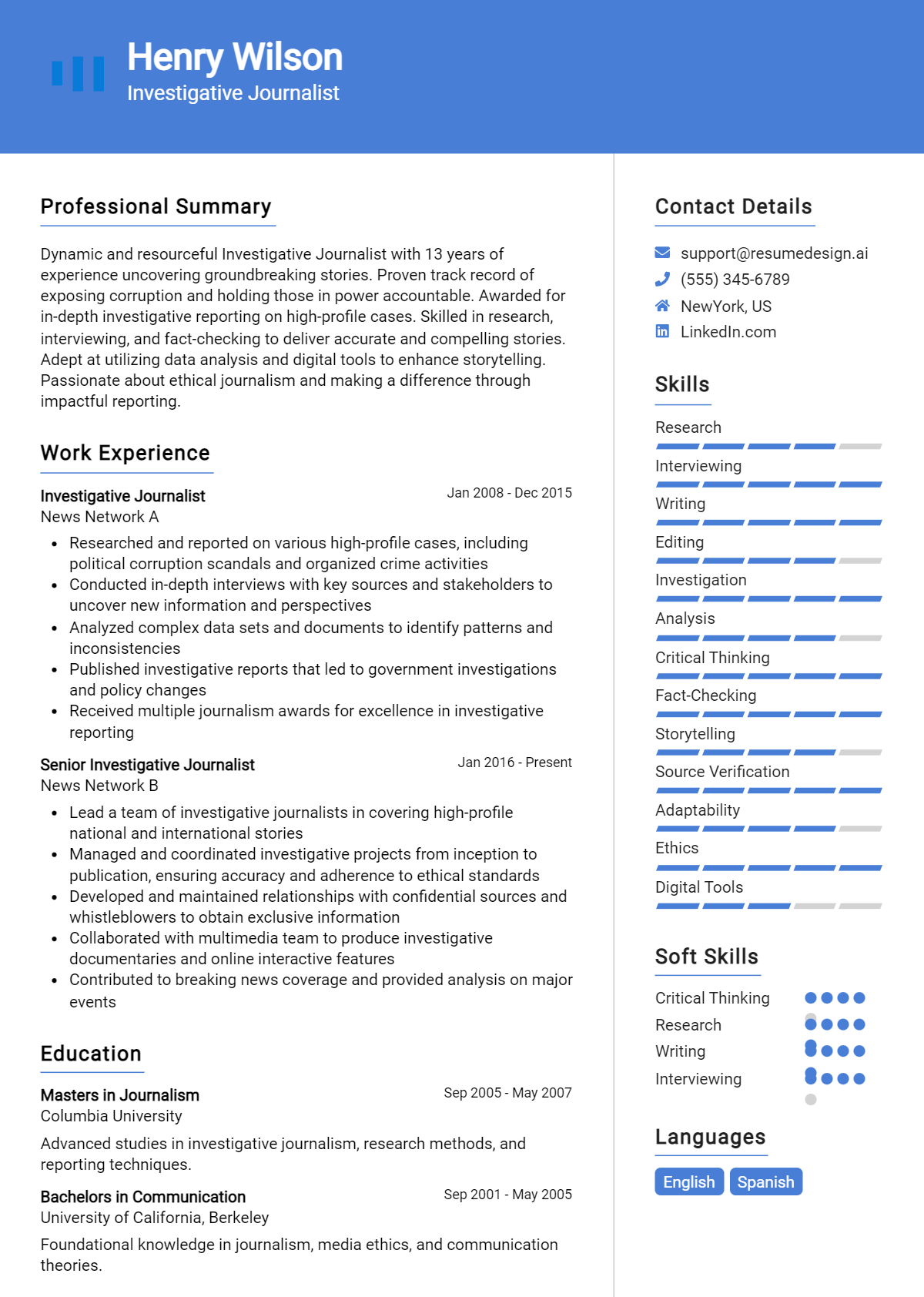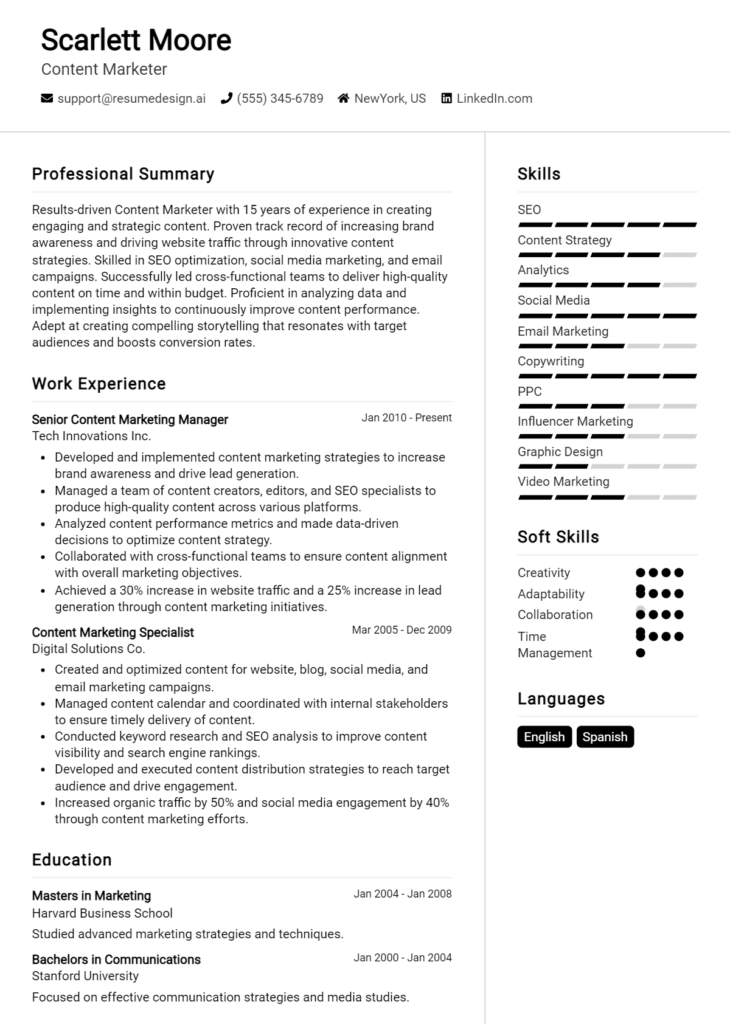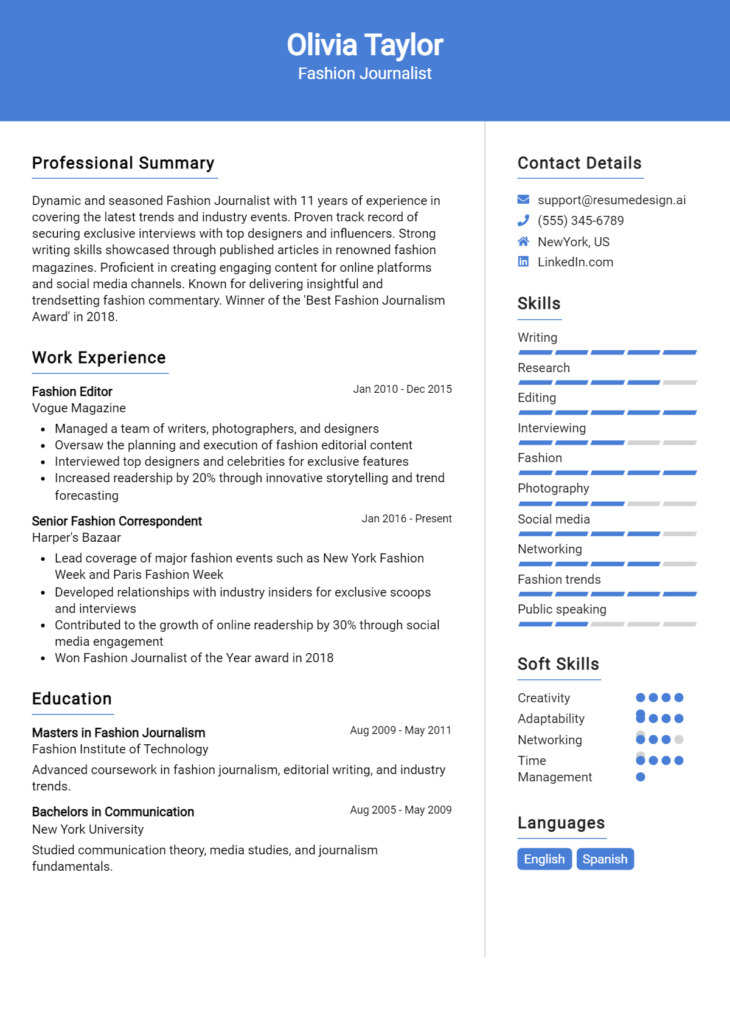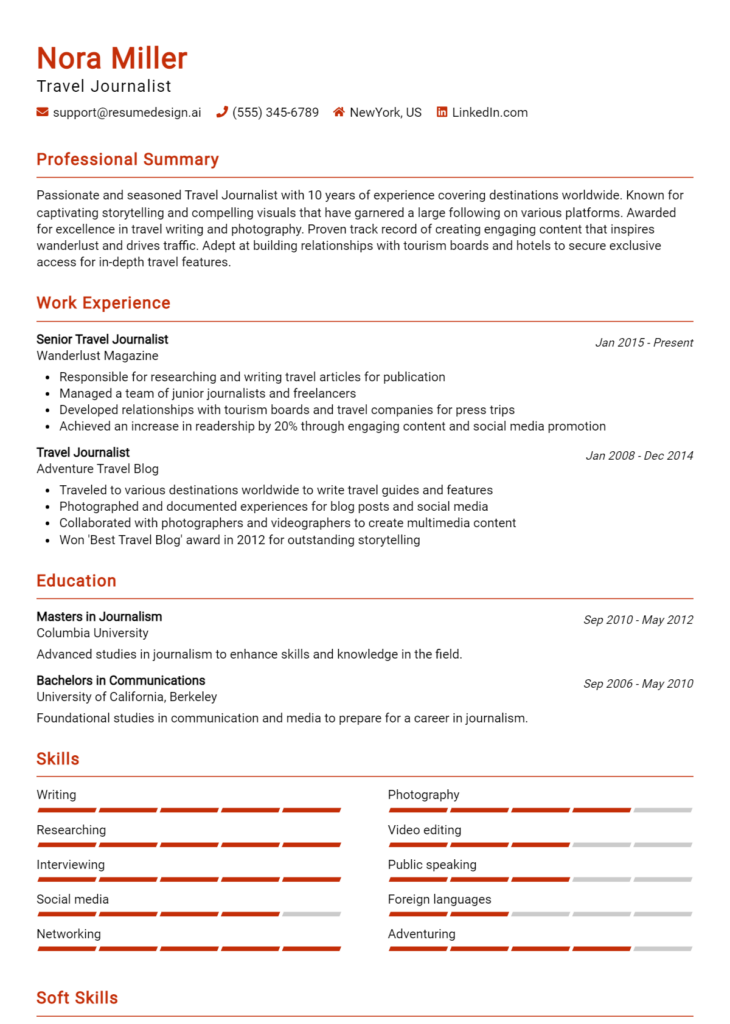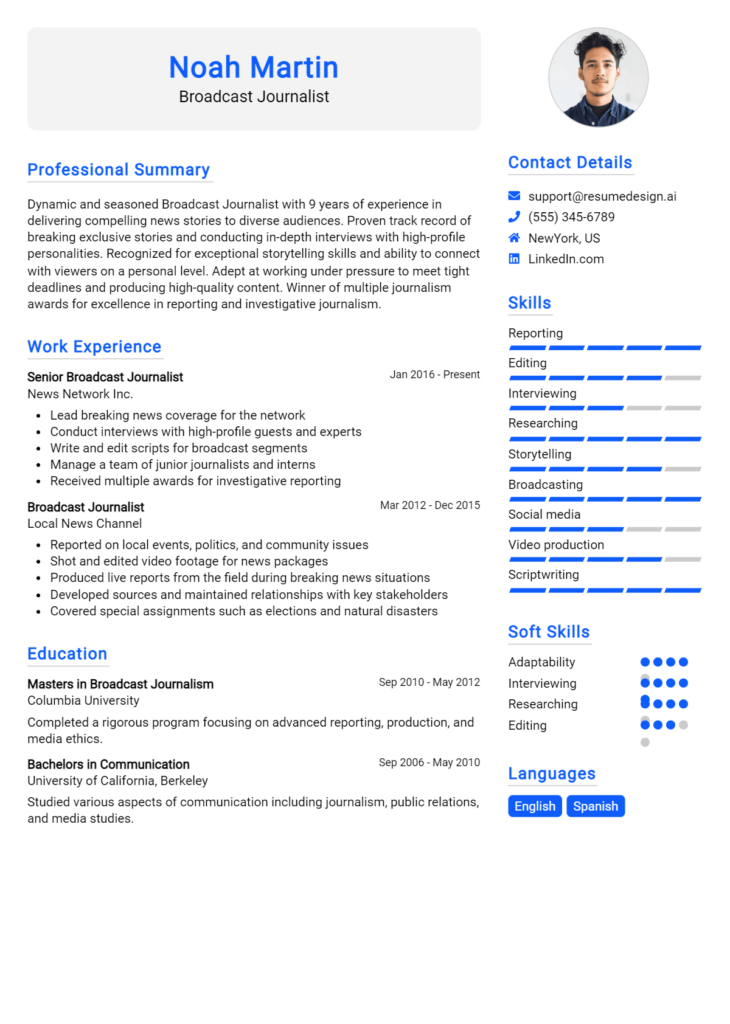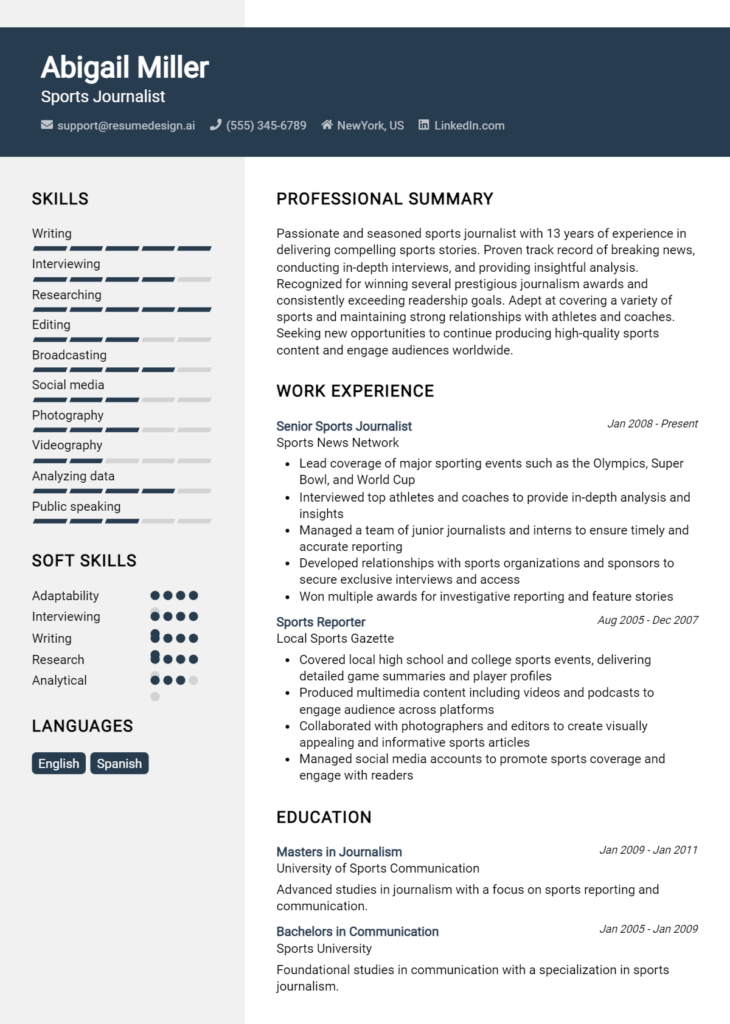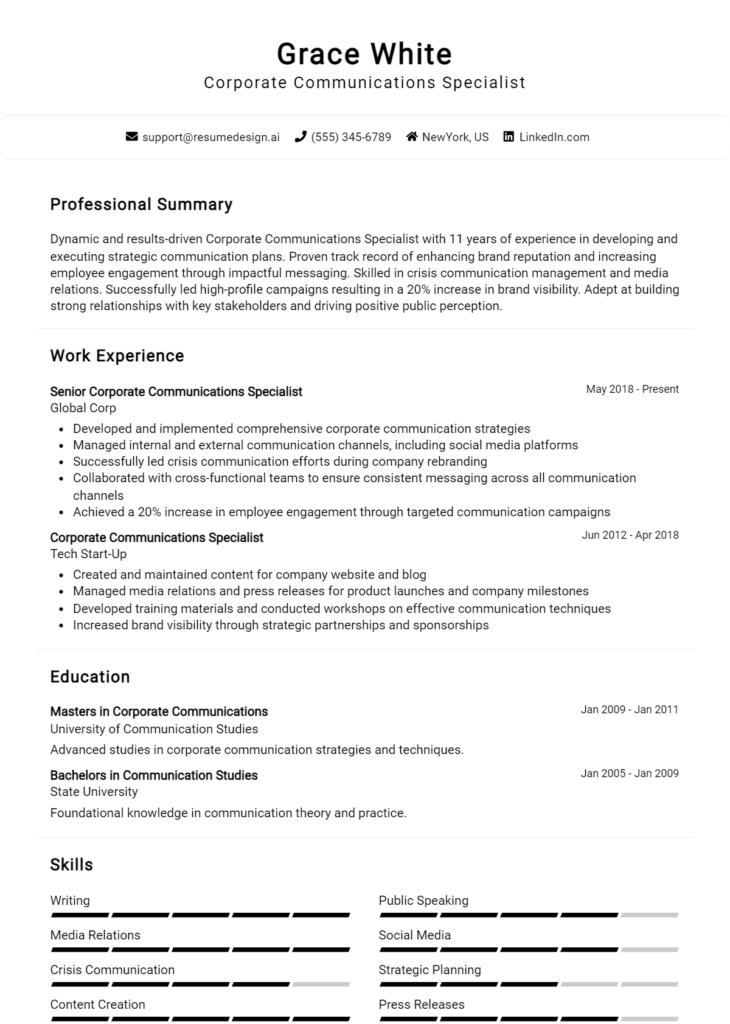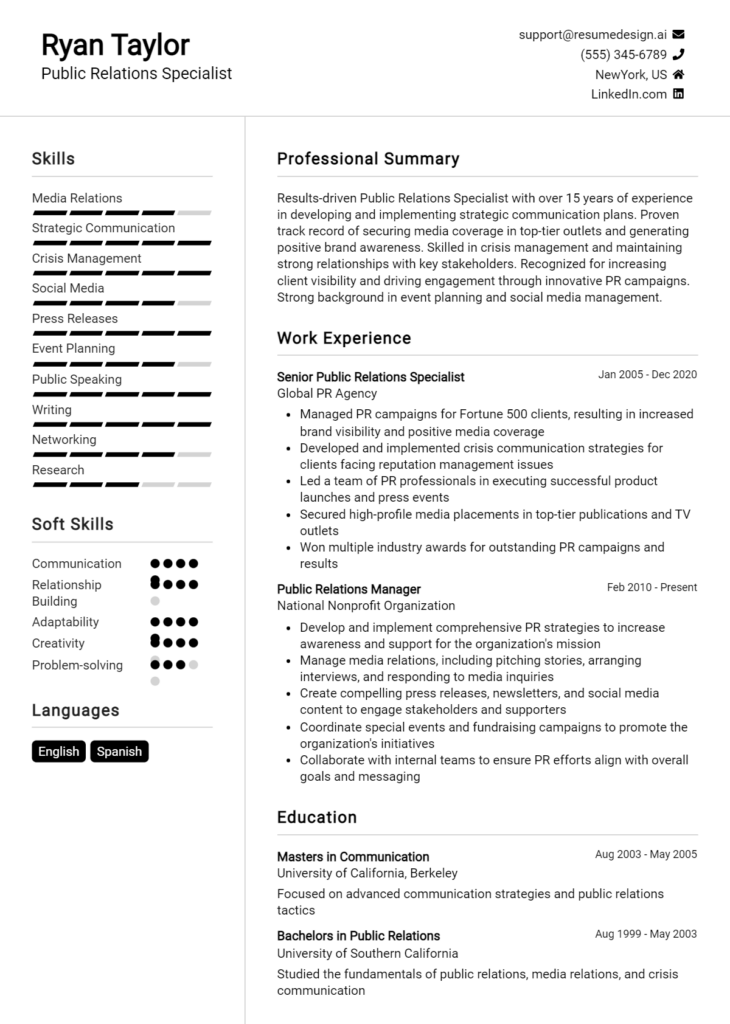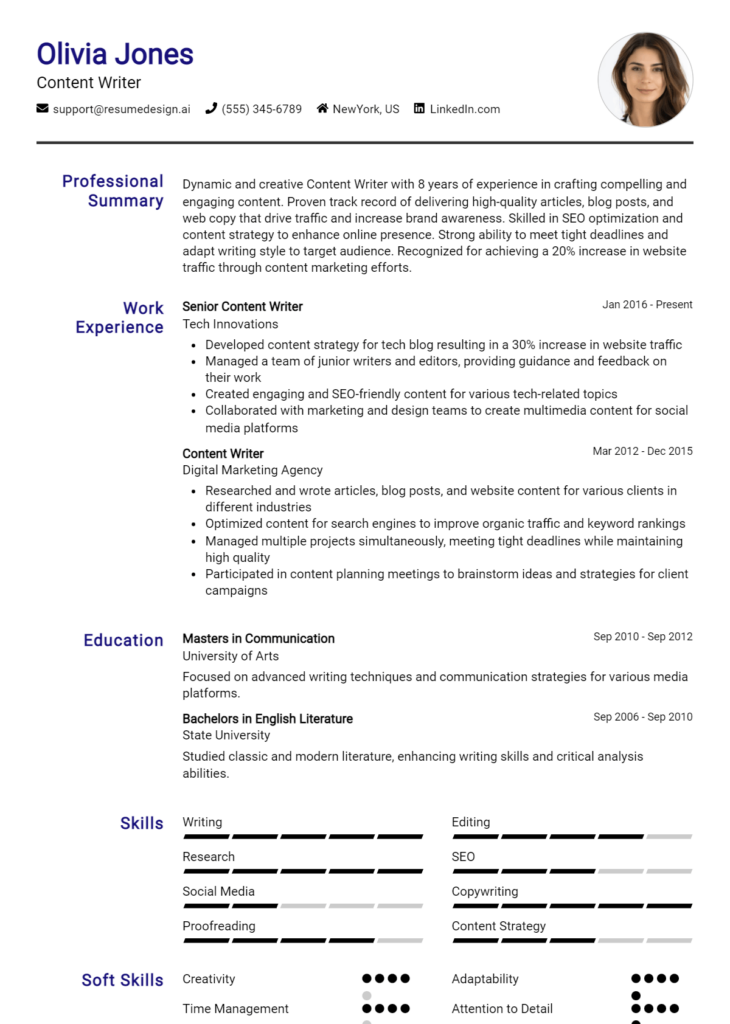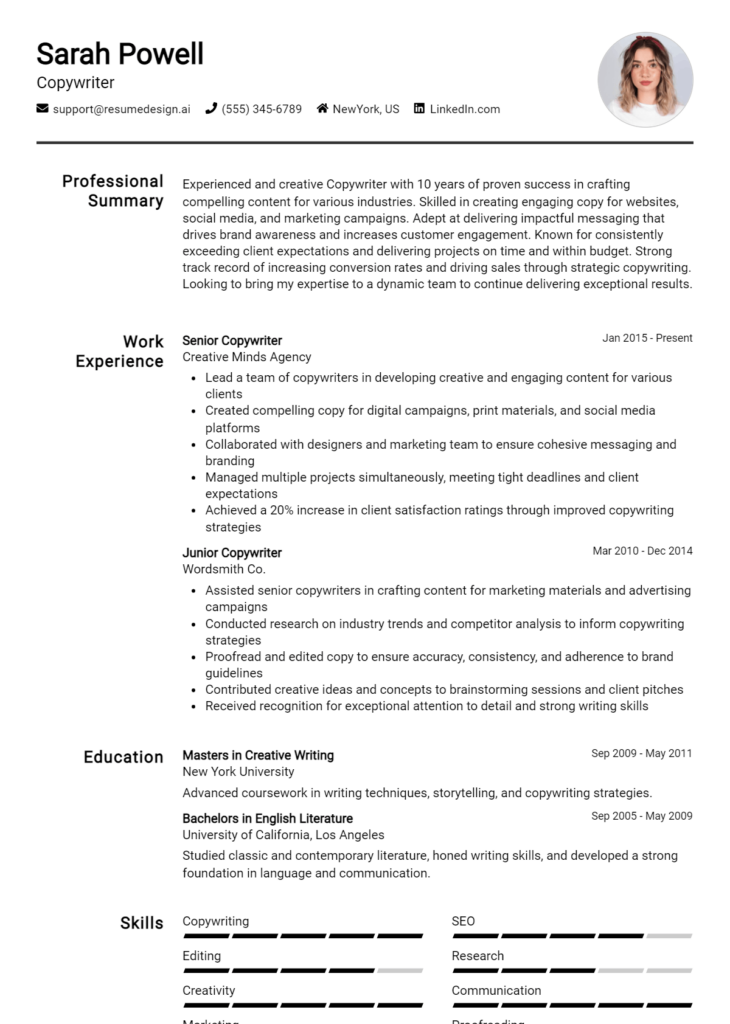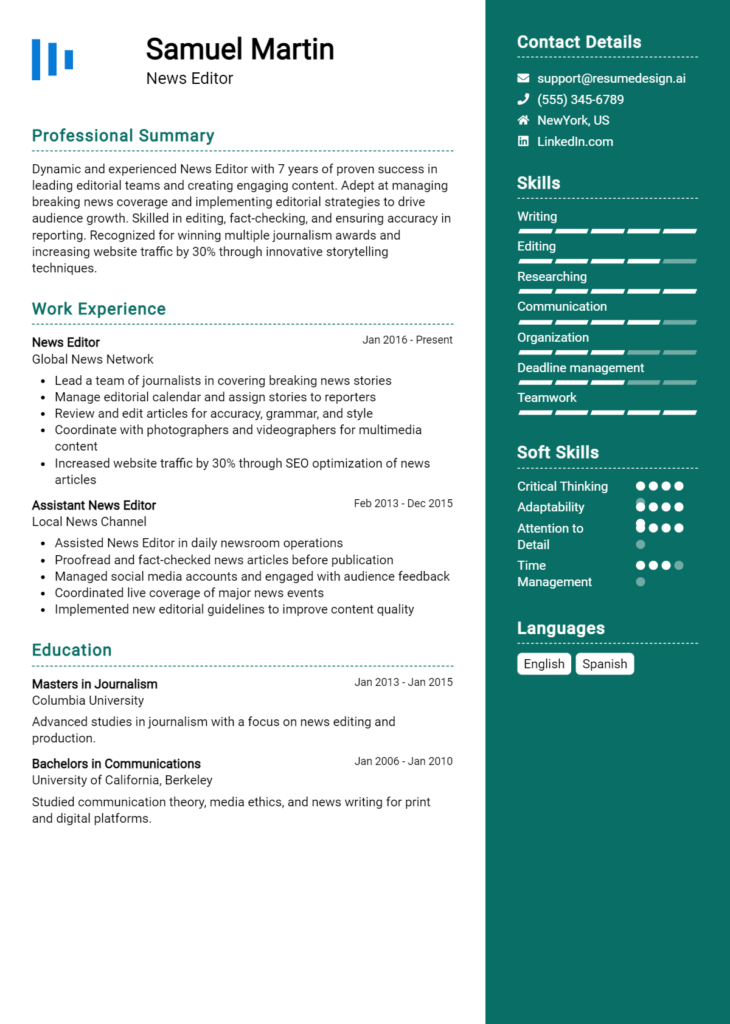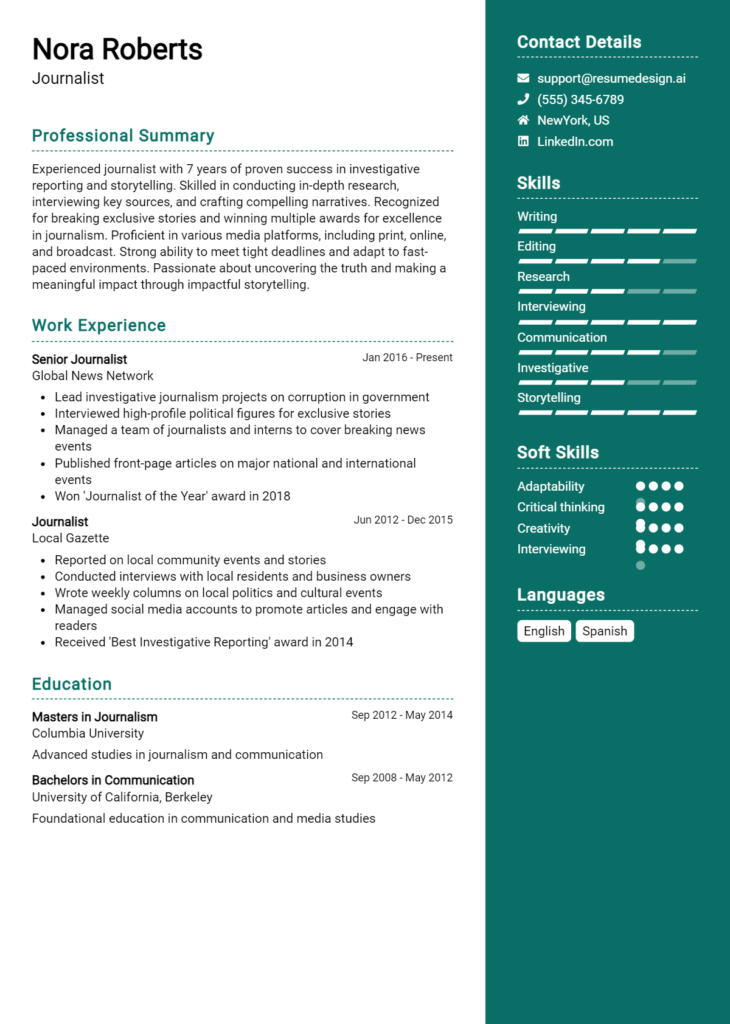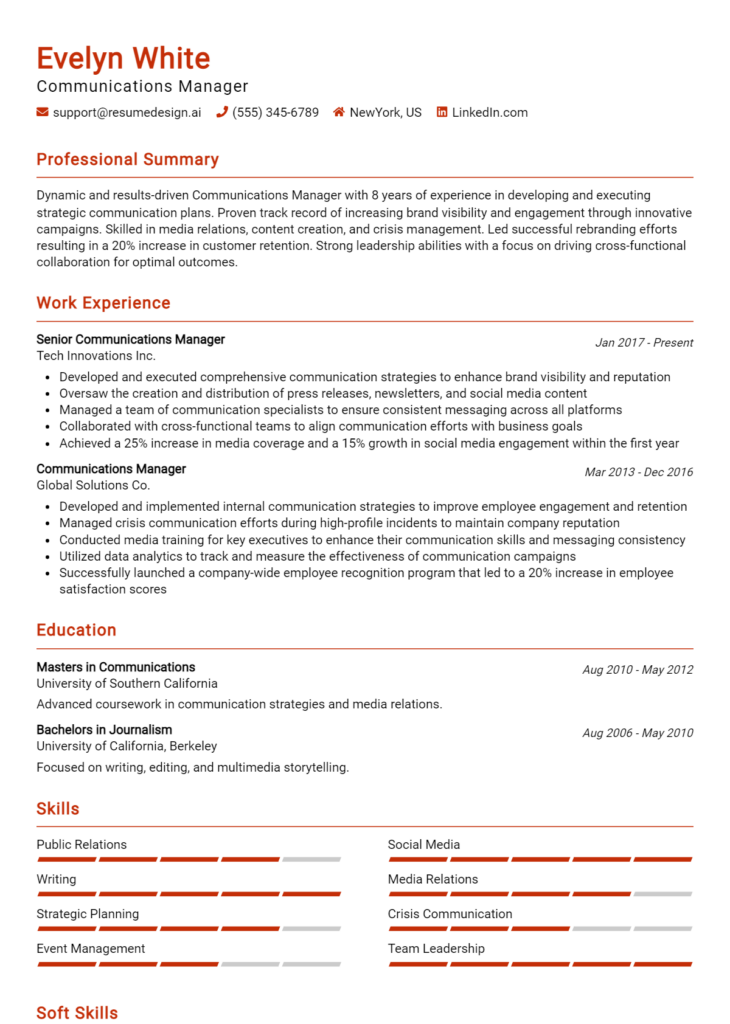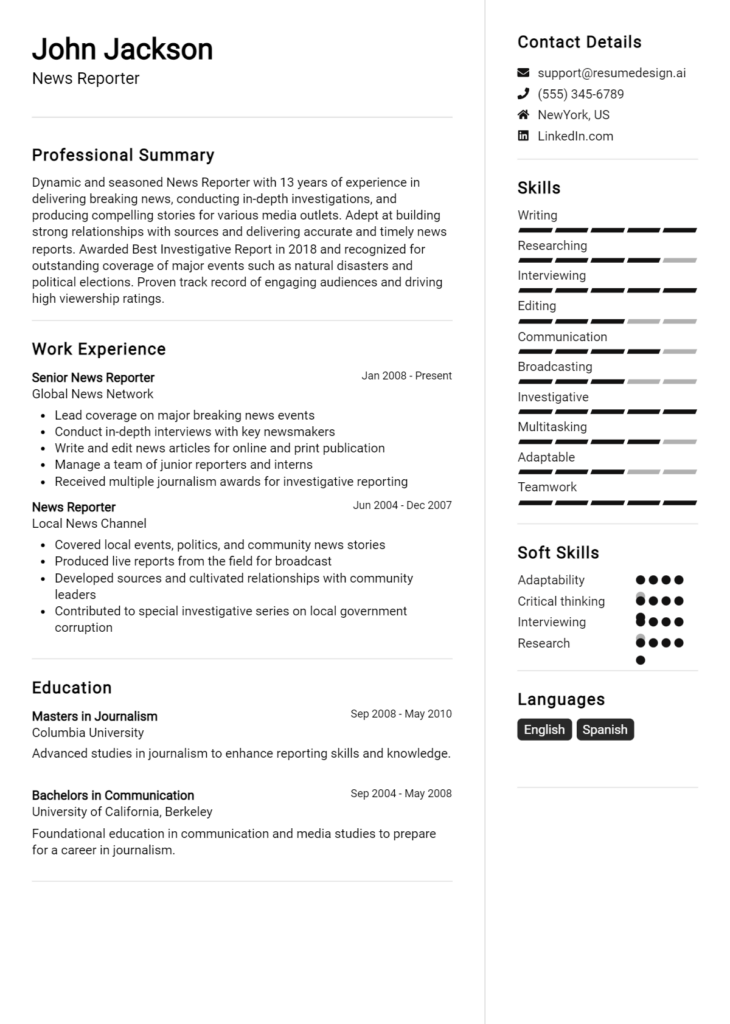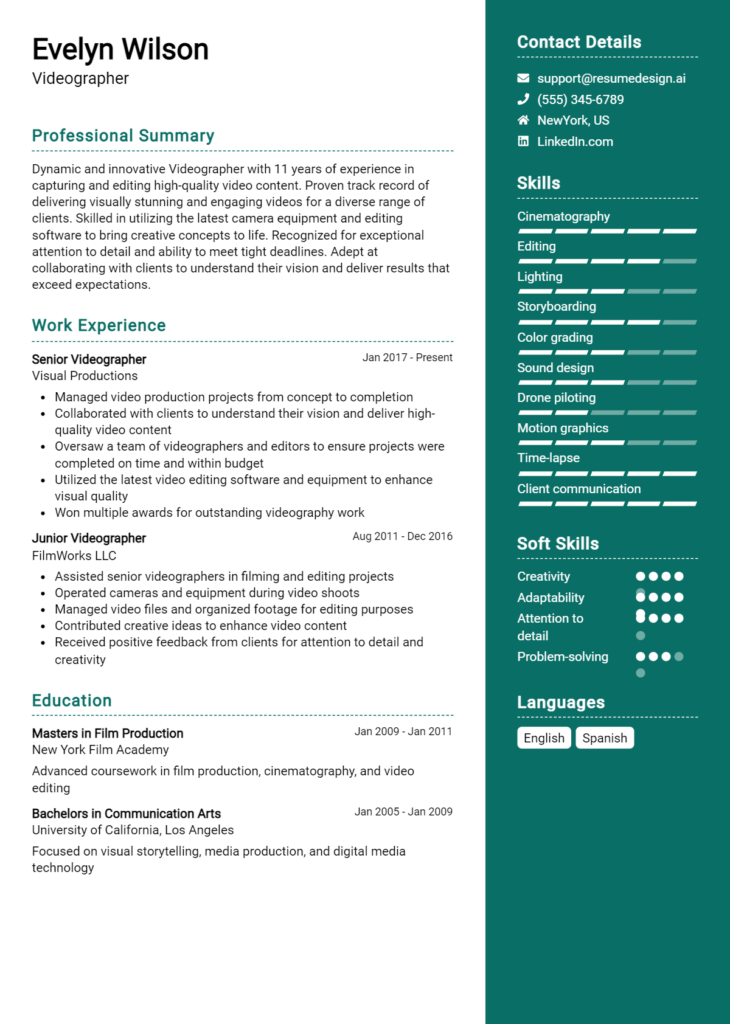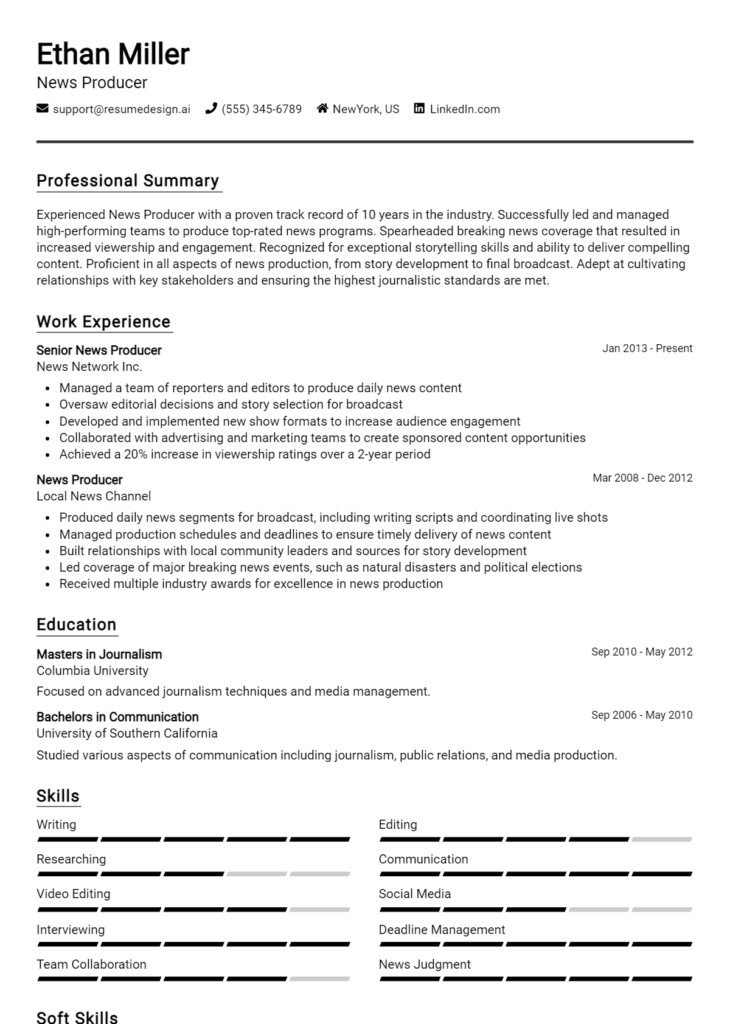Investigative Journalist Core Responsibilities
Investigative journalists play a crucial role in uncovering truths and holding power to account, requiring a blend of technical proficiency, operational insight, and advanced problem-solving skills. They must navigate various departments, collaborating with legal teams, editors, and data analysts to ensure thorough investigations. Proficient in research and critical thinking, they contribute significantly to an organization’s objectives by revealing significant stories. A well-structured resume that highlights these competencies is essential for showcasing their qualifications effectively.
Common Responsibilities Listed on Investigative Journalist Resume
- Conduct thorough research and analysis to uncover critical information.
- Interview sources, witnesses, and experts to gather insights.
- Write compelling articles that present findings clearly and accurately.
- Utilize data journalism techniques to analyze and interpret complex data sets.
- Collaborate with editors and other journalists to refine stories.
- Ensure compliance with legal standards and ethical guidelines.
- Develop and maintain a network of contacts for information sourcing.
- Investigate public records and documents for relevant information.
- Produce multimedia content, including video and audio segments.
- Stay updated on current events and trends to identify potential stories.
- Present findings in a clear and engaging manner to diverse audiences.
- Work under tight deadlines while managing multiple projects effectively.
High-Level Resume Tips for Investigative Journalist Professionals
In the competitive field of investigative journalism, a well-crafted resume serves as a crucial gateway to securing your next opportunity. It is often the first impression you make on potential employers, and it needs to effectively communicate your unique skills, experiences, and achievements. A thoughtfully designed resume not only showcases your journalistic prowess but also reflects your ability to uncover stories and engage audiences. This guide will provide practical and actionable resume tips specifically tailored for investigative journalist professionals, empowering you to present your qualifications in the best light possible.
Top Resume Tips for Investigative Journalist Professionals
- Tailor your resume to the job description, using relevant keywords and phrases that align with the specific requirements of the position.
- Highlight your investigative experience prominently, detailing specific stories you’ve covered and the impact they had on the community or industry.
- Quantify your achievements by including metrics such as audience reach, engagement statistics, or awards received to demonstrate your effectiveness and credibility.
- Showcase your research skills by detailing methodologies used in investigations, including interviews, data analysis, or public records requests.
- Include a section on industry-specific skills such as proficiency in multimedia storytelling, social media engagement, or data journalism.
- Utilize a clean and professional format that enhances readability and allows key information to stand out.
- Incorporate relevant affiliations, such as membership in journalism organizations or participation in investigative journalism workshops.
- Consider adding a portfolio link to showcase your best work, including articles, videos, or other multimedia projects that exemplify your investigative skills.
- Keep your resume concise, ideally one page in length, focusing on the most pertinent information that aligns with the job you’re applying for.
Implementing these tips can significantly enhance your resume, increasing your chances of landing a job in the investigative journalism field. By presenting a compelling narrative of your skills and accomplishments, you will not only capture the attention of hiring managers but also position yourself as a strong candidate ready to tackle challenging stories and contribute to quality journalism.
Why Resume Headlines & Titles are Important for Investigative Journalist
In the competitive field of investigative journalism, a well-crafted resume headline or title is essential for capturing the attention of hiring managers. A strong headline serves as a powerful first impression, summarizing a candidate's key qualifications in one impactful phrase. It should be concise, relevant, and tailored specifically to the job being applied for, allowing hiring managers to quickly understand the candidate's value and expertise. An effective resume headline not only grabs attention but also sets the tone for the rest of the resume, encouraging further reading and consideration.
Best Practices for Crafting Resume Headlines for Investigative Journalist
- Keep it concise: Aim for one impactful sentence that summarizes your expertise.
- Be role-specific: Tailor your headline to the investigative journalism position you are applying for.
- Highlight key strengths: Emphasize your most relevant skills or achievements.
- Use action-oriented language: Start with strong verbs that convey your abilities and contributions.
- Avoid jargon: Use clear, straightforward language that can be easily understood.
- Incorporate keywords: Include industry-specific terms that align with the job description.
- Make it unique: Stand out from other candidates by showcasing what makes you different.
- Focus on impact: Consider including measurable achievements or notable experiences.
Example Resume Headlines for Investigative Journalist
Strong Resume Headlines
Award-Winning Investigative Journalist with 10+ Years of Experience in Exposing Corruption
Driven Investigative Reporter Specializing in Data Analysis and Environmental Issues
Experienced Journalist with Proven Track Record of Uncovering Complex Stories
Investigative Journalist Skilled in Digital Storytelling and Multimedia Reporting
Weak Resume Headlines
Journalist Looking for Opportunities
Experienced Professional in the Media Field
Writer with Some Experience
Strong resume headlines are effective because they clearly communicate the candidate’s unique strengths and experiences, compelling hiring managers to take a closer look at their qualifications. They are specific, concise, and tailored to the role, making them memorable and impactful. In contrast, weak headlines fail to impress due to their vagueness and lack of focus, leaving hiring managers no reason to delve deeper into the candidate's resume. By avoiding generic phrases and instead opting for strong, targeted headlines, candidates can significantly enhance their chances of being noticed in a crowded job market.
Writing an Exceptional Investigative Journalist Resume Summary
A well-crafted resume summary is essential for investigative journalists as it serves as the first impression to hiring managers. In a field where attention to detail and impactful storytelling are paramount, a strong summary quickly captures the reader's interest by highlighting key skills, relevant experience, and notable accomplishments. This concise and powerful introduction should be tailored to the specific job, allowing candidates to showcase their most pertinent qualifications and set the tone for the rest of their resume.
Best Practices for Writing a Investigative Journalist Resume Summary
- Quantify Achievements: Use numbers and statistics to illustrate the impact of your work.
- Focus on Skills: Highlight relevant skills such as research, writing, and critical thinking.
- Tailor the Summary: Customize your summary for the specific job description to demonstrate alignment with the role.
- Be Concise: Aim for 2-4 sentences that deliver maximum impact without unnecessary details.
- Showcase Experience: Include specific experiences that demonstrate your investigative capabilities.
- Highlight Awards or Recognition: Mention any accolades or recognition that validate your work as a journalist.
- Use Action Verbs: Start sentences with strong action verbs to convey a sense of accomplishment and initiative.
- Maintain Professional Tone: Ensure the language used is professional and reflects the seriousness of the investigative journalism field.
Example Investigative Journalist Resume Summaries
Strong Resume Summaries
Dynamic investigative journalist with over 7 years of experience uncovering corruption and misconduct, resulting in 5 major legislative changes. Expert in data analysis and sourcing, with a proven track record of producing award-winning articles recognized by the National Press Club.
Detail-oriented reporter skilled in conducting in-depth interviews and extensive field research. Successfully exposed a multi-million dollar fraud scheme that led to criminal charges against 10 individuals, showcasing a commitment to accountability in journalism.
Accomplished investigative journalist with a knack for storytelling and a background in law. Published over 50 articles in leading national newspapers, with a focus on social justice issues, directly influencing public opinion and policy reform.
Weak Resume Summaries
Experienced journalist looking for a new opportunity in investigative reporting.
I have written many articles and have some experience in journalism. I am looking to work in a challenging role.
The strong resume summaries effectively demonstrate quantifiable results, specific skills, and direct relevance to the role of an investigative journalist, showcasing the candidates' accomplishments and expertise. In contrast, the weak summaries are vague and lack concrete details, making them less impactful and memorable to hiring managers. A strong resume summary is essential in differentiating candidates in a competitive field.
Work Experience Section for Investigative Journalist Resume
The work experience section of an Investigative Journalist's resume is critical in demonstrating the candidate's technical skills, leadership capabilities, and ability to deliver high-quality investigative reporting. This section serves as a platform to highlight the candidate's proficiency in research, data analysis, and storytelling while illustrating their experience in managing teams and projects. Quantifying achievements, such as increased readership or successful outcomes from investigations, is vital to substantiate claims and align experiences with industry standards. A well-crafted work experience section can distinguish a candidate in a competitive field, showcasing not just what they have done, but the impact of their work.
Best Practices for Investigative Journalist Work Experience
- Clearly articulate investigative techniques and tools used in previous roles.
- Include specific metrics or data points to quantify the impact of your work.
- Highlight collaboration with other journalists, editors, or teams to emphasize teamwork.
- Detail any leadership roles undertaken, such as leading investigations or mentoring junior reporters.
- Focus on relevant experience that aligns with the job you are applying for.
- Utilize strong action verbs to convey your contributions effectively.
- Incorporate awards or recognitions received for your investigative work.
- Maintain clear and concise language to ensure readability and impact.
Example Work Experiences for Investigative Journalist
Strong Experiences
- Led a team of five journalists in a year-long investigation into local government corruption, resulting in a series of articles that led to the resignation of three city officials and a 25% increase in readership for the publication.
- Uncovered a major data breach in a healthcare organization, utilizing advanced analytical tools, which prompted legislative hearings and increased cybersecurity measures in the industry.
- Collaborated with a multimedia team to produce a documentary on environmental pollution, achieving over 1 million views online and earning a regional award for investigative excellence.
- Authored a multi-part series on human trafficking that influenced state policy changes, with a documented 40% increase in reported cases due to raised public awareness.
Weak Experiences
- Worked on various stories for the newspaper.
- Helped with research for investigations.
- Participated in team meetings to discuss stories.
- Wrote articles that were published in the local section.
The strong examples provided are considered effective because they clearly define the candidate's specific achievements, quantifiable results, and collaborative efforts, demonstrating their impact on the publication and the community. In contrast, the weak examples lack specificity and measurable outcomes, making them less impressive and failing to convey the candidate's true capabilities and contributions in the field of investigative journalism.
Education and Certifications Section for Investigative Journalist Resume
The education and certifications section of an Investigative Journalist's resume is crucial as it showcases the candidate's academic foundation, relevant certifications, and commitment to ongoing professional development. This section not only highlights the skills and knowledge acquired through formal education but also emphasizes the candidate's dedication to staying current in a rapidly evolving field. Including relevant coursework, specialized training, and recognized certifications can significantly enhance a candidate's credibility and demonstrate their alignment with the requirements of the investigative journalism role.
Best Practices for Investigative Journalist Education and Certifications
- Focus on degrees in journalism, communications, or related fields to establish a strong academic background.
- Include industry-recognized certifications from reputable organizations to validate expertise.
- Highlight relevant coursework that pertains directly to investigative reporting, ethics, or multimedia storytelling.
- Detail any specialized training in areas such as data journalism, digital forensics, or legal reporting.
- Use clear and concise formatting to ensure easy readability and quick reference.
- Keep the section updated with the latest certifications and educational achievements.
- Emphasize any honors or recognitions received during academic pursuits to stand out.
- Tailor the education and certifications section to align with the specific requirements of the job being applied for.
Example Education and Certifications for Investigative Journalist
Strong Examples
- Bachelor of Arts in Journalism, University of California, Berkeley
- Certified Investigative Journalist (CIJ) from the Investigative Reporters and Editors (IRE)
- Advanced Data Journalism Certification, Poynter Institute
- Coursework in Criminal Justice Reporting, University of Southern California
Weak Examples
- Bachelor of Science in Biology, State University
- Certification in Basic Computer Skills from a local community center
- High School Diploma, Class of 2000
- Outdated certification in Print Journalism from a defunct organization
The strong examples listed above are considered effective because they directly relate to the skills and knowledge necessary for a successful career in investigative journalism, showcasing relevant degrees and recognized certifications that enhance the candidate's credibility. In contrast, the weak examples are inadequate as they either lack relevance to the field of journalism or represent outdated qualifications that do not contribute to the applicant's professional development, thereby diminishing their appeal to potential employers.
Top Skills & Keywords for Investigative Journalist Resume
The role of an investigative journalist is both challenging and rewarding, requiring a unique blend of skills that are crucial for uncovering truths and delivering compelling stories. A well-crafted resume for this profession not only highlights relevant experiences but also emphasizes key skills that demonstrate the candidate's ability to navigate complex situations, conduct thorough research, and communicate effectively. By showcasing a combination of soft and hard skills, an investigative journalist can present themselves as a versatile professional capable of adapting to the ever-evolving landscape of journalism. For more insights into essential skills, you can explore this link on skills.
Top Hard & Soft Skills for Investigative Journalist
Soft Skills
- Critical thinking
- Strong communication
- Attention to detail
- Ethical judgment
- Curiosity and inquisitiveness
- Adaptability
- Time management
- Collaboration and teamwork
- Problem-solving
- Resilience
Hard Skills
- Research proficiency
- Investigative techniques
- Data analysis
- Interviewing skills
- Multimedia storytelling
- Understanding of legal frameworks
- Proficient in digital tools and software (e.g., CMS, databases)
- Fact-checking
- Social media savvy
- Knowledge of public records and access laws
A well-rounded skill set is essential for investigative journalists to succeed in their careers. By combining these hard skills with relevant work experience, candidates can create impactful resumes that stand out in a competitive job market.
Stand Out with a Winning Investigative Journalist Cover Letter
Dear Hiring Manager,
I am writing to express my interest in the Investigative Journalist position at [Company Name], as advertised on [Job Board/Website]. With a robust background in investigative reporting, a passion for uncovering the truth, and a commitment to holding power to account, I am excited about the opportunity to contribute to your esteemed publication. I have spent over five years reporting on complex stories that require meticulous research, in-depth interviews, and the ability to distill intricate information into clear and compelling narratives.
During my tenure at [Previous Company Name], I led an award-winning investigation into local government corruption, which not only exposed unethical practices but also resulted in significant policy changes and greater transparency within the community. My ability to forge relationships with sources, both on and off the record, has been crucial in uncovering hidden truths. I am adept at utilizing public records, data analysis, and digital tools to enhance my investigations, ensuring that my reporting is both accurate and impactful. These skills have equipped me to tackle challenging stories across various beats, including politics, social justice, and environmental issues.
I am particularly drawn to [Company Name] because of your commitment to investigative journalism that drives meaningful change. I admire your recent series on [specific investigation or story], which not only highlighted systemic issues but also sparked public discourse and accountability. I believe my investigative skills, along with my dedication to ethical journalism and storytelling, align perfectly with your mission. I am eager to bring my expertise to your team and help shine a light on the stories that matter most to our communities.
Thank you for considering my application. I look forward to the opportunity to discuss how my experience and vision can contribute to the impactful work at [Company Name].
Sincerely,
[Your Name]
[Your Contact Information]
Common Mistakes to Avoid in a Investigative Journalist Resume
Crafting an effective resume as an investigative journalist is crucial for standing out in a competitive field. Many applicants make common mistakes that can undermine their chances of landing an interview. To increase your chances of success, it's important to be aware of these pitfalls and avoid them when presenting your skills and experiences. Here are some common mistakes to watch out for:
Generic Objective Statement: Using a one-size-fits-all objective statement can make your resume feel impersonal. Tailor it to reflect your specific goals and how they align with the publication’s mission.
Lack of Quantifiable Achievements: Failing to include measurable outcomes from your previous work can weaken your impact. Highlight specific achievements, such as the number of articles published or investigations that led to policy changes.
Ignoring Keywords: Not incorporating relevant keywords from the job description can cause your resume to be overlooked by Applicant Tracking Systems (ATS). Make sure to include terms that reflect the skills and experiences sought by employers.
Overloading with Jargon: Using excessive industry jargon can alienate readers who may not be familiar with specific terms. Aim for clear, concise language that effectively communicates your expertise without being overly technical.
Neglecting to Showcase Multimedia Skills: In today’s digital landscape, failing to highlight your multimedia skills (e.g., video editing, podcasting) can be a missed opportunity. Include experiences that showcase your versatility across various platforms.
Poor Formatting: A cluttered or confusing layout can distract from your content. Utilize a clean, organized format with consistent fonts and spacing to ensure your resume is easy to read.
Omitting Relevant Experiences: Not including freelance work, internships, or volunteer positions can make your resume feel incomplete. Any relevant experience can demonstrate your commitment to journalism and investigative reporting.
Skipping the Cover Letter: Sending a resume without a cover letter can be a missed opportunity to explain your passion for investigative journalism and why you’re a great fit for the role. Always include a tailored cover letter to complement your resume.
Conclusion
As an investigative journalist, your role is crucial in uncovering the truth and holding the powerful accountable. Throughout this article, we've explored the essential skills and qualifications needed for success in this field, including strong research abilities, critical thinking, and a keen sense of ethics. We've also highlighted the importance of storytelling and effective communication, as these attributes can make or break a piece of investigative reporting.
In light of these insights, it's vital to ensure that your resume reflects your unique skills and experiences. Take a moment to review your Investigative Journalist Resume to ensure it effectively showcases your strengths and achievements.
To assist you in this process, we recommend utilizing resources like resume templates, which can provide a polished and professional layout. Additionally, consider using a resume builder for a user-friendly experience in crafting your document. If you're looking for inspiration, browse through our collection of resume examples tailored for investigative journalists. Lastly, don’t forget the importance of a well-crafted introduction; explore our cover letter templates to make a striking first impression.
Take charge of your career today by ensuring your resume stands out in this competitive field!

